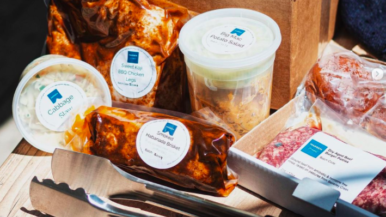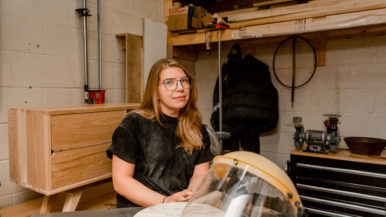“The whole company went into overdrive”: What it’s like to run a grocery delivery service in the middle of a pandemic

Fresh City, Canada’s largest commercial city farm, operates eight retail stores in Toronto, including Mabel’s Bakery and the Healthy Butcher, as well as a grocery delivery service. Like so many others in the grocery business, they were hit by an unprecedented spike in demand due to Covid-19 and had to rapidly adjust their operations to deal with the surge. Ryan Rudnickas, Fresh City’s retail store director, describes what it’s like to run a grocery delivery service in the middle of a pandemic.
Immediately following the WHO’s March 14 announcement officially deeming Covid-19 a pandemic, demand surged. The whole company went into overdrive. We saw the biggest increase in our online sales—the first week, we sold three times our regular volume, which was too hard on the team to be sustainable. Since then, we’ve capped our number of online customers so we can maintain safe and achievable goals. There’s now a waiting list 9,000 names long—that’s up from 3,000 just a couple of weeks ago. It’s definitely put a strain on our inventory and delivery system, so we’re in the process of expanding our facilities to accommodate the situation. We just took over more space in an existing packing facility at Dufferin and Lawrence, which should allow us to tackle a large portion of our wait-listed customers.
On March 19, we closed both of our Healthy Butcher locations and the Mabel’s Bakery on St. Clair West, and reduced the hours of operation at our Fresh City stores. Doing so lets us operate within really strict sanitation rules and with fewer staff at each location. Safety and sanitation are our first priority: we are sanitizing surfaces constantly, we have kitchen timers set up to remind the teams to wash their hands and sanitize their stations, and we’ve hired professional cleaning services. We’ve also added signage and sticker decals within the store to ensure physical distancing, sneeze guards at the checkout counters, cashless payments and recyclable boxes instead of reusable bags for deliveries—we normally ask customers to leave their empty reusable Fresh City bags out for collection at their next delivery, but that’s not ideal now. We’ve worked with staff to ensure we’re doing everything we can to operate safely, including asking anyone who isn’t feeling well to self-isolate. Our HR department tracks any illnesses and ensures staff are safe to return to work. Many have opted to go on CERB, and we have shifted around several staff members so they can work from home when possible. And we’re paying our front-line workers a $2-per-hour premium.
Our drivers are delivering seven days a week now instead of six, and they’re making deliveries way later into the night than they used to—sometimes as late as midnight—and into areas of the city we didn’t deliver to before. We’ve had to ramp up our customer support team to deal with all the new inquiries—we’ve brought on one new person, but have mostly rejigged our internal staff. We stopped making some of our prepared foods—wraps, several salads, smoothies and our meal jars—focusing instead on being able to reach more people rather than putting out a variety of products. We’ve even stopped serving espresso-based drinks in our stores, selling only drip coffee so we can get people in and out of the store as quickly as possible.
Initially, availability was a big issue, and we still continue to see shortages in certain areas—the latest popular item being eggs, with everyone baking more. We’re still seeing significant shortages of certain popular pantry items: canned goods, pasta, rice. But the supply chain is catching up and some of these items have become available again. We’re finding replacements where possible, but some products just won’t be available for a short period of time. I don’t think this is a terrible thing—it’s a good reminder where our food comes from. Our egg farmer’s chickens lay a certain amount of eggs daily, no matter how many times we ask for more.
It’s been a very challenging few weeks, and we’ve had to constantly adapt. Somehow, we managed to open a new store, which is no small effort given the climate. It’s at Bay and Gerrard, within walking distance of five major hospitals, so we’re really playing a part in meeting the grocery needs for thousands of front-line workers.
We’re exceptionally grateful for our dedicated team, many of whom have risen to the occasion and taken on new roles and responsibilities in order to cover for those who have had to stop working. Our CMO’s 70-year-old mother, Gerry Sinclair, is a really talented seamstress and has made more than 50 masks for our retail and delivery staff to wear. Our COO’s sister, Alana Snider, is also making masks for our team. Everybody has really stepped up to the plate.
Throughout it all, our customers have been amazing. We’ve had an infinite amount of positive reinforcement from our online and in-store communities. And that’s what’s keeping all our heads above water through this.
—As told to Liza Agrba







